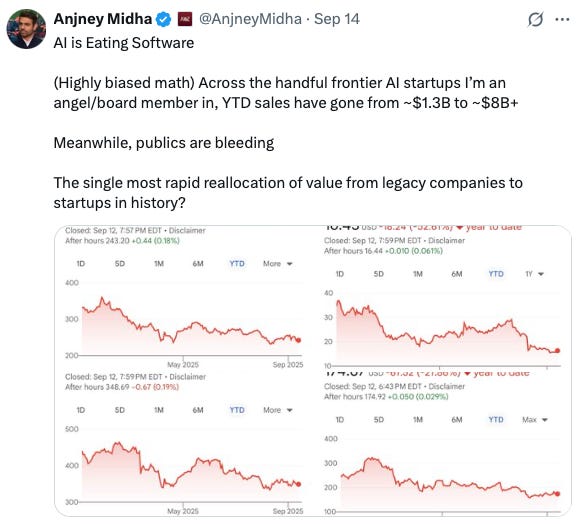Arrogance vs Humbleness
Learning in the Age of AI
Recently, I’ve been trying to help a friend out with his career. Incredibly successful in the corporate world and rapidly promoted, including a promotion to a big position in the past few months.
Unfortunately for him, he’s messing up left, right, and center to the point where his bosses and colleagues are super frustrated. Yet he’s oblivious to the issues.
So far, I’ve been unsuccessful in helping my friend, so I in turn talked it over with another friend to get her advice and thoughts. It was clear this was a pattern we’re seeing over and over again.
Arrogance versus Humbleness
Even before the advent of AI, this has been a challenge that has beset many leaders, particularly those earlier in their careers. Readers who have known me a while are likely smirking as they read this—what the heck, Alex is talking about humbleness? That Alex? That would be just the kind of thing he’d do—arrogant enough to think he can talk about being humble!
And in many ways, they would be right! Decades ago, when I was at Microsoft, I was very rapidly promoted, eventually becoming one of the youngest Corporate Vice Presidents in the company’s history at that time. To say that went to my head would be a charitable understatement.
Before continuing the story, allow me to define my terms a bit more. Arrogant, for this post, means convinced of your ideas and not willing to learn or listen. Such a person might be incredibly charming or otherwise a delight to be around, but if they don’t have a learning mentality, I’ll classify them as arrogant. Similarly, humbleness does not mean meek or lacking in conviction or decisiveness. It just means a willingness to say “I don’t know” and learn as much as they can-even if they have to make quick decisions in the face of limited information. You can be fast and hard-charging, yet still humble.
Anyway, back to my Microsoft days. At one point in that journey, I was responsible for a large, up-and-coming division of the company. For a variety of reasons, I felt the division needed a radical change in engineering culture, in pace of delivery, and in the business model for our customers. The actual details are not particularly important; for this story, suffice it to say that I failed in effecting the change I was trying to make.
Almost two decades later, I can confidently state that I was 100% right in the specifics, the “what” of the change. I was also 100% wrong in the “how”. I was so convinced of the need to change—it was so obvious to me back then—that I failed to lead the other people around me through the change—my team, my bosses, my peer executives.
I was right and they were wrong. Obviously! So why don’t they just accept it and do it?
Looking back on this, quite a number of my colleagues actually tried to help me and give me some coaching. It must have been so painfully clear to them how badly I was messing up! To respect their privacy, I’ll just say “thank you” to Bill, Steve, Hank, Ted, Toni, Eric, Mike, Brian, Lisa, Tom, Robbie, Satya, Kathleen, Bob, Ray, Rick, Qi, and undoubtedly countless more who tried to help. Despite all of that, I was too convinced of my own righteousness to see that I was actually messing up! Or, to put it differently, I wasn’t humble enough to listen to feedback and learn how to be more effective. I was right and they were wrong after all!
Coming back to the present, my friend is basically replaying the same mistakes I went through. He has a big new job and is firmly convinced of his ideas and ability to execute. But he’s completely failing to learn, listen, and collaborate with anybody else, particularly those with different opinions and experiences.
Arrogance over humbleness.
If this story were just about my friend, I doubt I would have written this up as a post.
What’s fascinating to me is that I’m now seeing this pattern everywhere, not just with newly promoted executives growing into their roles.
The big reason, of course, is AI.
It’s changing literally every field, and changing it fast. Nearly everything I thought I knew about building software products is basically thrown out the window. Worse, it’s changing literally every month as Google, OpenAI, xAI, Anthropic, and others constantly one-up each other with regular advances in AI-powered coding tools.
Trying to answer a “simple” question like “how long with this feature take?” is maddeningly difficult these days.
If the historical answer had been three weeks if it were done by hand, now the answer can be as short as ten minutes as the Codex AI agent just gets it done, or as long as four weeks (one week of trying to get the AI to do it before you give up and and say, forget it, I’ll do it by hand). Even harder, software projects used to have a fairly predictable “glide path” of becoming more and more solid as more and more bugs were fixed. Now, left unchecked, AI tools will gleefully change hundreds of lines of code at a single go, often introducing as many bugs as they fix. Ugg, when does this thing ever get stable?
It’s not just software development. Take marketing, for instance. In the “old days” (i.e., just a few years ago!), you could get a lot of mileage out of a content strategy focused on just publishing a large volume of decent-enough, valuable-enough content.
These days, however, that strategy is almost punished—it’s so easy to generate tons of AI-generated content slop that everyone is doing it. As a result, AI slop is now just part of the background noise. It’s basically ignored—both by humans and by other AIs like search and social media engines charged with maximizing revenue for their companies. In contrast, more authentic content from real humans that generates real human interactions and engagement is performing dramatically better. Unless, of course, that AI-generated content is funny stormtrooper videos:
Marketing will undergo another revolution in the coming months and years when AI starts automatically generating personalized content for each customer, live on demand. What is the right online marketing playbook, then? If you’re stuck in the past, it’s probably wrong!
I could go on and give example after example in other fields—human resources, legal, manufacturing operations, and so forth. The pattern still holds—everything is changing, and changing fast.
The arrogant folks are struggling the most to handle the change. I am seeing this over and over, nearly on a daily basis (names and specifics modified for privacy):
An engineering leader who thought he could create a competitive, high-performing engineering culture, yet hasn’t written code in nearly a decade and doesn’t even know about the latest software development tools.
A marketing leader who is “on the AI bandwagon” (in their words) because they automated cold email outreach with AI, going from a handful of personalized, handcrafted individual cold outreach emails to tens of thousands of spam emails sent daily.
The CEO who dismissed a tiny startup as “just a startup”, yet nine months later is losing nearly all of his business to them.
As a side note to all aspiring entrepreneurs—now is a great time to start a company! There are so many incumbents who will be “arrogant” and stuck in their ways. It's easy to outmaneuver them and solve customer problems with a faster, better, and cheaper solution. Check out this post from Andreessen Horowitz for a dramatic data point! https://x.com/AnjneyMidha/status/1967353416465965320
In contrast, I’m seeing humble learners absolutely crush it:
A finance executive with some great product ideas used v0.app and built her own prototype in hours. It’s undergoing user testing now!
A recent college graduate who successfully replatformed an entire software platform to a radically new and powerful database (https://convex.dev) in just a day. Nobody told him it was impossible, so he just did it anyway.
A CEO driving a strategic planning offsite. Usually, these off-sites involve lots of PowerPoint, lots of talking, maybe a memo produced at the end, and then some fun(?) team bonding (for whatever reason, whirlyball was the social bonding event of choice in my years at Microsoft. If you don’t know, just look it up).
Instead, this CEO got the team together for two intense days. In those two days, the current product roadmap was fully researched and reprioritized, and a new business line expansion was explored. It wasn’t just talk—the team literally did the customer and market research on a dozen different ideas, AND turned each idea into a working product for customer testing.
The CEO did yield to tradition, however, and had hot donuts brought in. No whirlyball, though!A CEO of a mid-sized financial consulting company is personally writing AI agents using Lindy.ai to automate his company’s processes, driving up revenue.
I could go on with more wild examples.
AI, in essence, has become the great equalizer and opportunity creator.
No longer do you need to spend years learning how to code to try out a technical idea—vibe coding tools can let anyone do it. It used to take days, if not weeks, to become facile enough in Adobe to decently edit a video. Now it can be done in seconds.
The world is changing fast. We all need to be humble learners.
At least as long as the robots let us….





Excellent observations Alex. Thank you!